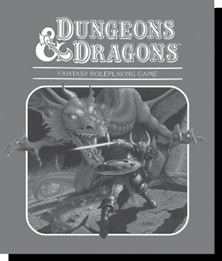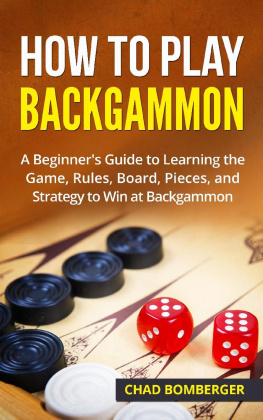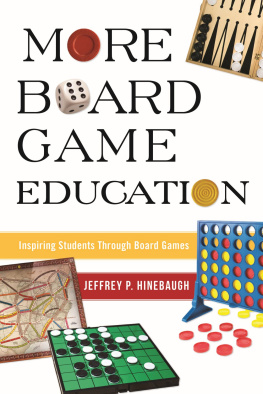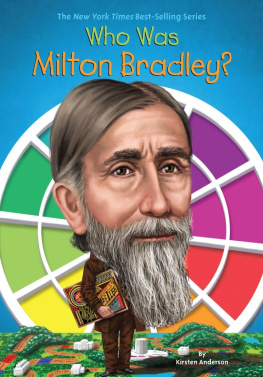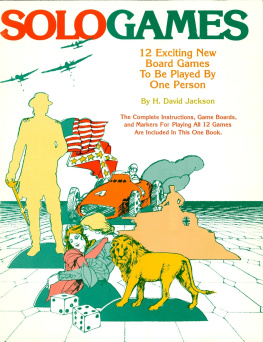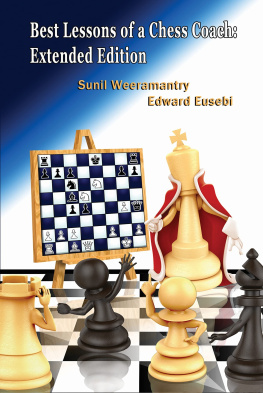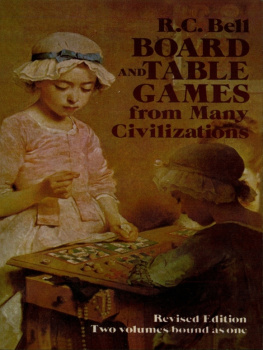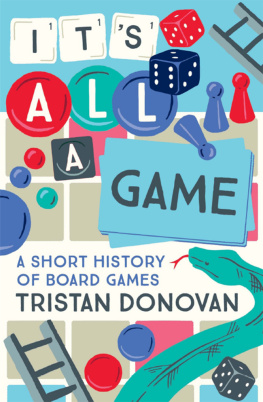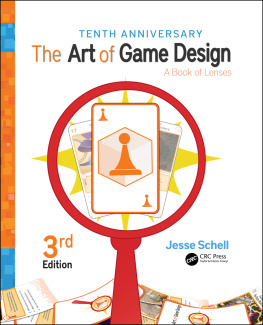A PERMUTED PRESS BOOK
ISBN: 978-1-68261-853-0
ISBN (eBook): 978-1-68261-854-7
Tortured Cardboard:
How Great Board Games Arise from Chaos, Survive by Chance, Impart Wisdom, and Gain Immortality
2019 by Philip E. Orbanes
All Rights Reserved
Cover Design by Cody Corcoran
No part of this book may be reproduced, stored in a retrieval system, or transmitted by any means without the written permission of the author and publisher.

Permuted Press, LLC
New York Nashville
permutedpress.com
Published in the United States of America
C HAPTER S IX


Were standing on the corner of 92nd and Lexington Avenue in New York City, gazing at the neighborhood grocery across the street. Its evening and the river of rush hour pedestrians has dwindled to a stream. Below my feet, the brakes of a rumbling Lexington Avenue train screech. A dozen or so disgorged passengers rise out of the ground. When the train sets itself in motion, a breeze swirls through the sidewalk grating, rustling my pant legs. Rather pleasant, given the late summer heat.
And now I wait, impatiently, for him to go into his trance and tell me why were loitering here, looking at bananas and potatoes.
He transforms quickly. Wow, shes just come out of the adjoining theater with that nerdy guy by her side. The Gnomes voice is enthralled. I wish you could see her, Phil. No wonder she ruled her times.
Who?
Marilyn, of course. The cameras are rolling. According to the theater marquee, she and Tom Ewell have just watched Creature from the Black Lagoon . Marilyn seems bothered by the heat; she diverts and stands over a subway grate. Oh my, a gust of air from a train has caught her white skirt. Its billowing up past her knees. The director says cut and asks her to do it againand then again. The crowd approves. There must be a thousand gawkers around me! Zowie!
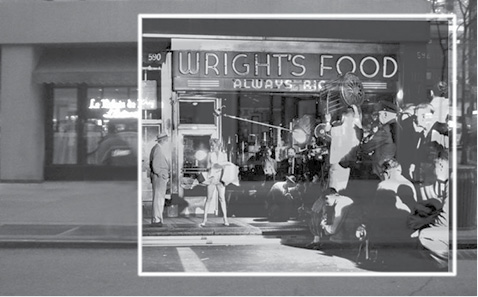
Zowie . The Gnome is channeling Joe E. Brown from Marilyns 1959 movie, Some Like It Hot. When is all this happening?
September fifteenth, 1954. Like I said, wish you could be here with me.
Calm down, Gnomie, I admonish. Did you divert here just so you could see Marilyn Monroe film her most famous scene?
The Gnome makes a disapproving sound; I am obviously too dense to appreciate his brilliance. Two big cultural events happened on this day, Phil. This one here in Manhattan while only thirty miles away James Brown is finishing the creation of his game, Careers.
James Brown, the soul singer? (Im jesting.)
No, Doctor James Cooke Brown, soon to become a professor at the University of Florida. But at this moment in 1954, he is working as a statistical analyst for a large research firm. We will pay him a visit after two other must-see places in Manhattan.
The Gnome leads me into a neighborhood bookstore. Its a combination of old fixtures and new lighting. Im gazing at the best sellers on this day in 1954, he informs me. I see The Power of Positive Thinking by Norman Vincent Pealea book that is still selling. Oh, and theres the topical one Im looking for: Why Johnny Cant Read . It advocates teaching phonics in school systems, a new idea at the time. And it sounds an even bigger alarm.
And that, Phil, is why we are in a bookstore. In the glow of the postwar boom, worries have cropped up that American kids are falling behind. Education is not adapting to modern needs. Children learned by rote and are trained for narrow occupational choices, many of which are outdated. Meanwhile, a growing demand for scientists, engineers, and technicians goes under-filled. The Gnome adds, as an aside, The book sells for two bucks. The newspapers at the register go for a nickel.
What are the headlines?
The Russians are rattling their nuclear swordand the evening editions say there were massive flight delays up and down the East Coast due to storms. Good thing we werent flying back then, eh?
Righttell me more about the educational crisis. How does it relate to Careers?
The Gnome snaps his fingers. Uncanny timing. When the game appears on the market, career planning and better education are drumbeats in America.
You say this is in 1954?
Yes, definitely.
While I did not see Careers on store shelves until 1957, reminiscing about the game makes me want to play again, and not just for old times sake.
Careers was amazing. You won not by accumulating the most moneyas in Monopoly and other financial gamesbut by achieving a personal (and confidential) success formula, comprising happiness, fame, and money points (one for each thousand dollars you accumulated). You could devise any formula as long as it totaled sixty points, which you recorded under a flap at the top of your score sheet.
You traveled around the perimeter of the game board and carefully decided to take inside paths representing different careers and college. In the 1950s, the games vicarious thrills seemed as vivid as todays virtual reality. My sixth-grade classmates and I played Careers countless times. It certainly made me think about having an exciting career when I grew up.
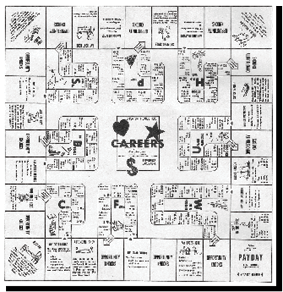
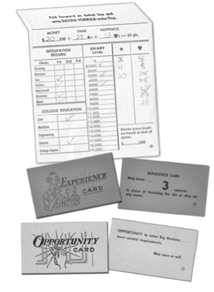
Dollar signs, stars, and hearts represented money, fame, and happiness. You rolled two dice when moving around the outer path of the board, but only one when moving along an inner career path. You gained the opportunity to enter one of these paths if you landed on its entrance and met its requirementas in real life, credentials were essentialor paid money to fund your endeavor. Four of the occupations were open to you if you had the appropriate college degree. To earn a degree, you needed complete the College path. You could pick a different degree each time you went to college and graduated. Tuition was five hundred dollars (not inaccurate by the standards of the day!).
Using Politics as an example, you could enter if you had the appropriate degree (Law) or made a campaign donation of three thousand dollars, or you had prior experiencemeaning youd successfully completed the Politics path earlier in the game.
A wonderful feature of Careers was the ability to choose some of your moves, thanks to its Opportunity Knocks and Experience cards. Spaces on the outer track awarded you an Opportunity Knocks card, which gave you the power to move to a particular entrance space (such as Opportunity to enter Big Business). As the game progressed and you earned more of these, you became the master of your fate. Sometimes a card even granted you an all-expenses-paid admission. Experience cards were earned upon completing a career and by landing on certain spaces of the inner paths. Each granted you a specific move (one, two, three, or four spaces) in lieu of rolling the roll. These cards were crucial to play when moving through a career with nasty negative spaces. Experience counts my mother used to say; this adage was born out in Careers.
Next page
